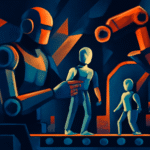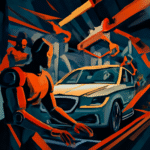Key Points
- The Unitree Robotics IPO process has officially begun, advised by CITIC Securities (Zhongxin Zhengquan 中信证券), with an expected official application by October 2025, likely targeting China’s STAR Market (Kechuangban 科创板).
- Founded by Wang Xingxing (Wang Xingxing 王兴兴), Unitree has annual revenues exceeding ¥1 billion RMB ($140 million USD) and has maintained consistent profitability since 2020, a rarity in the robotics sector.
- The company’s recent Series C funding round in June 2025 was co-led by major players like China Mobile (Zhonggou Yidong 中国移动), Tencent (Tengxun 腾讯), Alibaba (Alibaba 阿里), and Ant Group (Manyi 蚂蚁).
- China’s embodied AI industry is experiencing a significant funding boom, with 133 investment events and over ¥18 billion RMB ($2.52 billion USD) invested in 2025 so far, surpassing last year’s total.
- The industry focus is shifting from hype to commercialization and real-world adoption, with predictions of humanoid robots accelerating deployment in industrial and service sectors within the next three to five years.

The Unitree Robotics IPO is officially in motion, marking a huge milestone in the race for embodied AI dominance.
What started as rumors is now a reality.
According to the China Securities Regulatory Commission (CSRC), Unitree Robotics (Yushu Keji 宇树科技) has started its pre-listing tutoring.
They’ve tapped CITIC Securities (Zhongxin Zhengquan 中信证券) as their advising institution.
Based on the current schedule, we could see Unitree’s official IPO application hit the market as early as October 2025.
This isn’t just about one company; it’s a signal that the capital race for embodied artificial intelligence is heating up fast.
Unitree’s Big Move: The IPO Is Officially On
On July 18, 2025, Unitree officially kicked off the process by registering with the Zhejiang Securities Regulatory Bureau.
Here’s the support team they’ve assembled for the listing:
- Advising Institution: CITIC Securities (Zhongxin Zhengquan 中信证券)
- Legal Counsel: Beijing Deheng Law Firm
- Accounting Firm: Rongcheng Certified Public Accountants
The plan is for CITIC to complete its assessment of Unitree’s listing eligibility by October 2025.
While Unitree hasn’t officially named its target listing board, many investors are betting their “first choice” will be the STAR Market (Kechuangban 科创板), China’s answer to the Nasdaq.
Unitree’s focus is on building and selling high-performance general-purpose legged and humanoid robots, along with dexterous robotic arms for both consumer and industrial use.
Who’s Behind Unitree? Founder, Financials, and Backers
The company is led by its controlling shareholder and founder, Wang Xingxing (Wang Xingxing 王兴兴).
He directly holds 23.8216% of the company’s equity.
He also controls another 10.9414% through a partnership, giving him a total controlling stake of 34.7630%.
Now for the numbers that really matter.
Wang Xingxing previously revealed that Unitree’s annual revenue has soared past ¥1 billion RMB ($140 million USD).
Even more impressive?
Unitree is one of the very few profitable companies in the robotics space, and it has consistently maintained profitability every single year since 2020.
This financial stability has attracted a ton of attention, especially after their robots went viral for performing the ‘Yangko’ dance on CCTV’s Spring Festival Gala.
Several publicly listed companies have also jumped in, indirectly investing in Unitree through various funds:
- Jingxing Paper (Jingxing Ziyi 景兴纸业)
- Langke Intelligent (Langke Zhineng 朗科智能)
- Shiyi Communication (Shiyida 实益达)
- Jihua Group (Jihua Jituan 吉华集团)
- Kingfa Sci. & Tech. (Jinfu Keji 金发科技)
- Sangfor Technologies (Shenxinfu 深信服)
- Wolong Electric Drive (Wolong Dianqu 卧龙电驱)
- ThunderSoft (Zhongke Chuangda 中科创达)

Find Top Talent on China's Leading Networks
- Post Across China's Job Sites from $299 / role
- Qualified Applicant Bundles
- One Central Candidate Hub
Your First Job Post Use Checkout Code 'Fresh20'

The Embodied AI Funding Frenzy: Everyone Wants a Piece
The IPO isn’t happening in a vacuum. The entire embodied AI sector is experiencing a massive funding boom.
Just before this IPO news, Unitree closed its Series C financing in June 2025.
This round was a who’s who of tech and venture capital, co-led by funds from:
- China Mobile (Zhonggou Yidong 中国移动)
- Tencent (Tengxun 腾讯)
- Jinqiu (锦秋)
- Alibaba (Alibaba 阿里)
- Ant Group (Manyi 蚂蚁)
- Geely Capital (Jili Zhiben 吉利资本)
- China Mobile (Zhonggou Yidong 中国移动)
- Tencent (Tengxun 腾讯)
- Jinqiu (锦秋)
- Alibaba (Alibaba 阿里)
- Ant Group (Manyi 蚂蚁)
- Geely Capital (Jili Zhiben 吉利资本)
An investor in the Series C round admitted that the anticipation of an imminent IPO was a key reason they participated.
The trend is industry-wide.
Just in July 2025, several other embodied AI startups like Xingdong Jiyuan (星动纪元), Tashi Zhihang (它石智航), Xinghaitu (星海图), and Xiaoyu Zhizao (小雨智造) all announced new financing rounds.
Even investors famous for other sectors are getting in on the action. Xu Xin (Xu Xin 徐新), the “Queen of Venture Capital” and founder of Today Capital, recently invested in Xinghaitu.
Meanwhile, battery giant CATL (Ningde Shidai 宁de 时代) led a new ¥1.1 billion RMB ($154 million USD) financing round for Galaxy Universal (Yinhe Tongyong 银河通用).
The data speaks for itself.
According to ITjuzi (ITjuzi 桔子) Venture Capital Data Service Platform, as of July 19, 2025, there have been 133 investment events in China’s embodied AI industry this year alone.
The total investment has surpassed a staggering ¥18 billion RMB ($2.52 billion USD), blowing past last year’s total numbers.
One investor put it perfectly: “We have also been advising companies to ‘stockpile plenty of ammunition’ during the current relatively relaxed financing window.”
The logic is simple: the industry’s technical roadmap and killer app are still up for grabs.
Companies with the most cash have the best chance to survive, experiment, and ultimately win.

ExpatInvest China
Grow Your RMB in China:
- Invest Your RMB Locally
- Buy & Sell Online in CN¥
- No Lock-In Periods
- English Service & Data
- Start with Only ¥1,000

From Hype to Reality: The Race for Real-World Adoption
While the funding is flowing, the industry is getting smarter.
Investors are moving beyond hype factors like founder backgrounds and are now laser-focused on a company’s path to commercialization and its real-world progress.
Feng Bo (Feng Bo 冯博), managing partner at Changrui Capital (Changrui Zhiben 常垒资本), says the industry is in a key transition phase: “from proof-of-concept to early commercialization.”
He predicts that, much like electric vehicles and large language models, the robotics industry will undergo a significant consolidation. The leaders will pull away from the laggards.
To that end, product implementation has become the new battleground.
We’re seeing more and more partnerships between AI startups and established industrial players:
- Zhiyuen Robotics (Zhiyuan Renqiren 智元机器人) is working with Fulun Precision Manufacturing (Fulun Jinggong 富临精工) to test industrial robots as “porters” in their facilities.
- Xingdong Jiyuan (星动纪元) has partnered with Beizi Technology (Beizi Keji 北自科技). Their full-size humanoid robot, STAR1, is already undergoing practical factory training for handling, sorting, and scanning.

Resume Captain
Your AI Career Toolkit:
- AI Resume Optimization
- Custom Cover Letters
- LinkedIn Profile Boost
- Interview Question Prep
- Salary Negotiation Agent

What’s Next? The 3-5 Year Outlook for Humanoid Robots
So, where is this all heading?
Unitree’s founder, Wang Xingxing, believes that over the next three to five years, humanoid robots will accelerate their deployment in industrial, service, and certain hazardous environment scenarios.
This view is echoed by industry analysts.
Wang Feili (Wang Feili 王斐丽), a China Machinery Industry Analyst at UBS Securities (Ruisheng Zhengquan 瑞银证券), predicts a specific adoption sequence:
1. Industrial & Service Scenarios first.
2. Household & Consumer applications later.
- Industrial & Service Scenarios: Projected to see accelerated deployment due to simpler safety requirements and higher cost tolerance.
- Hazardous Environments: Specific applications in challenging conditions.
- Household & Consumer Applications: Expected to follow later, as these require a higher technical bar for complex task handling.
The reasoning?
Industrial settings have simpler safety requirements and a much higher tolerance for cost.
In contrast, home users expect a robot to handle a huge variety of complex tasks, which is a much higher technical bar to clear.
Ultimately, while the funding and IPOs are exciting, the long-term success of any embodied AI company will come down to one thing: achieving large-scale product deployment and generating real commercial value.
The Unitree Robotics IPO is a massive step, but the marathon for market leadership has just begun.






